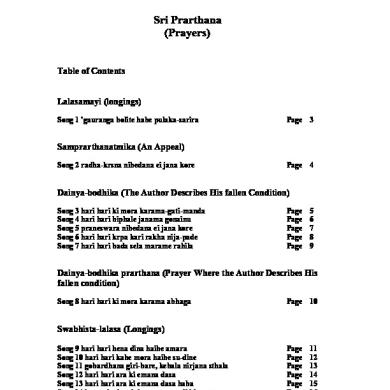Bhaktivinoda Thakura
This document was uploaded by user and they confirmed that they have the permission to share it. If you are author or own the copyright of this book, please report to us by using this DMCA report form. Report DMCA
Overview
Download & View Bhaktivinoda Thakura as PDF for free.
More details
- Words: 551
- Pages: 1
Bhaktivinoda Thakura Srila Bhaktivinoda Thakura, then known as Kedarnatha Datta was born in 1838, in Birangara (Bengal). The youngest of seven sons, his father Raja Krisananda Datta was a great devotee of Lord Nityananda. The family lived in fairly wealthy circumstances, until Kedarnatha's father passed away in 1849, when they were reduced to poverty. In 1850, Kedarnatha's mother arranged a marriage with the five-year-old daughter of Madhusudana Mitra Mahasaya ; a resident of Rana Ghata. Kedarnatha was taught by his uncle Kasiprasada Ghosh Mahasaya Thakura, at his home in Calcutta. Kasiprasada, having studied under the British education system was a central figure in many literary circles and the editor of the Hindu Intelligencer. Kedarnatha studied his uncle's books and helped him in submitting articles to the newspaper. He became an expert in English as a reader, speaker and writer. When he was 18, he went to college in Calcutta, where he wrote extensively in both English and Bengali ( these essays were published locally). He also lectured frequently in both languages. His best friend through these years was Sriman Dvijendranatha Thakura, the eldest son of Maharsi Devendranatha Thakura Having seen the corruption in the business world Kedarnatha decided to become a teacher. He established an English school in Kendrapara, a village near Chutigrama in Orissa, thus pioneering English education in the state. Some time later he went to Puri and passed a teachers' examination; he got a teacher's post in a Cuttack school and later became headmaster of a school in Bhadraka and then in Madinipura. His dedicated work was noted by the school-board authorities. As headmaster, Bhaktivinoda studied the various religions and came to the realisation that the only real religion established in Bengal, albeit poorly, was that of Sri Caitanya Mahaprabhu. In Bhadraka, his first son Annada Prasada (Acyutananda) was born, in 1860. After his wife died he married Bhagavati De in the town of Jakapura. In 1861, Bhaktivinoda took up a government post as deputy magistrate in Bengal. In the years to come , he took up several government posts, chiefly as deputy magistrate in various parts of Bengal. He read Sri Caitanya-caritamrta repeatedly; his faith in Krishna Consciousness increasing until he was totally absorbed in the pure bhakti-sastras day and night. Between the years 1874 and 1893, Bhaktivinoda Thakura spent much time in seclusion chanting the holy name (though he still executed his worldly duties); he wrote several books in Sanskrit such as Sri Krsna samhita, Tattva-sutram and Tattva-viveka and Datta-kausubha. He also wrote many books in Bengali such as the Kalyana-kalpataru. Srila Bhaktivinoda Thakura was an outstanding scholar and through the course of his life he was to write hundreds of books; a career he started at the age of 12. He spoke Bengali, Sanskrit, English, Latin, Urdu, Persian and Oriya. He managed to obtain and write a Sanskrit commentary on the Caitanyopanisada. His other literary works include Sri Caitanya Siksamrta, and also the Vaisnava-siddhantamala, Prema-pradipa and Manah-siksa. Whilst in Puri, Srila Bhaktivinoda Thakura became manager of the Jagannatha Temple . He established regular worship of the Deity. In the temple courtyard he established a 'Bhakti Mandapa', where daily discourses of Srimad-Bhagavatam were held. Srila Bhaktivinoda Thakura would spend long hours discussing Krsna and chanting the holy name, especially at Tota-Gopinatha Mandir, the tomb of Haridasa
Related Documents

Bhaktivinoda Thakura
October 2019 2
